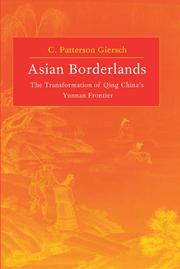| Listing 1 - 10 of 10 |
Sort by
|
Book
Year: 1963 Publisher: New York : Ronald Press,
Abstract | Keywords | Export | Availability | Bookmark
 Loading...
Loading...Choose an application
- Reference Manager
- EndNote
- RefWorks (Direct export to RefWorks)
Book
Year: 1959 Publisher: London : Lawrence & Wishart,
Abstract | Keywords | Export | Availability | Bookmark
 Loading...
Loading...Choose an application
- Reference Manager
- EndNote
- RefWorks (Direct export to RefWorks)
Ethnology --- Slavery --- Yunnan Province (China) --- Social conditions.
Book
Year: 1949 Publisher: New York : Institute of Pacific Relations,
Abstract | Keywords | Export | Availability | Bookmark
 Loading...
Loading...Choose an application
- Reference Manager
- EndNote
- RefWorks (Direct export to RefWorks)
Land tenure --- Shan (Asian people) --- Tibetans. --- Tibétains --- Yunnan Province (China) --- Hsi-kʻang sheng (China) --- Social conditions.

ISBN: 0520935543 1597344540 9780520935549 0585389535 9780585389530 0520226232 9780520226234 0520226313 9780520226319 0500226232 9781597344548 Year: 2001 Publisher: Berkeley University of California Press
Abstract | Keywords | Export | Availability | Bookmark
 Loading...
Loading...Choose an application
- Reference Manager
- EndNote
- RefWorks (Direct export to RefWorks)
In Erik Mueggler's powerful and imaginative ethnography, a rural minority community in the mountains of Southwest China struggles to find its place at the end of a century of violence and at the margins of a nation-state. Here, people describe the present age, beginning with the Great Leap Famine of 1958-1960 and continuing through the 1990's, as ""the age of wild ghosts.
Ethnology. --- Ethnology-- China-- Yunnan Sheng. --- Yunnan Sheng (China) - Social conditions. --- Ethnology --- #SBIB:39A75 --- Cultural anthropology --- Ethnography --- Races of man --- Social anthropology --- Anthropology --- Human beings --- Etnografie: Azië --- Yunnan Sheng (China) --- Social conditions. --- Yünnan, China (Province) --- Yün-nan sheng (China) --- Yunnan Province (China) --- Yün-nan (China : Province) --- Unnan-shō (China) --- Unnanshō (China) --- Yün-nan sheng jen min cheng fu (China) --- Yün-nan sheng cheng fu (China) --- Yun Nan Province (China) --- 云南省 (China)

ISBN: 0674021711 9780674021716 Year: 2006 Publisher: Cambridge, Mass. Harvard University Press
Abstract | Keywords | Export | Availability | Bookmark
 Loading...
Loading...Choose an application
- Reference Manager
- EndNote
- RefWorks (Direct export to RefWorks)
History of Asia --- China: South --- Tai (Southeast Asian people) --- Thaï (Peuple d'Asie du Sud-Est) --- History --- Histoire --- Yunnan Sheng (China) --- Yunnan (Chine : Sheng) --- Ethnic relations --- Relations interethniques --- S09/0412 --- S04/0680 --- China: Foreign relations and world politics--China and South-East Asia (incl. Vietnamese war) --- China: History--Qing: general: 1644 - 1912 --- Thaï (Peuple d'Asie du Sud-Est) --- Dai (Southeast Asian people) --- Tai race --- Tayok (Southeast Asian people) --- Thai Che (Southeast Asian people) --- Thai Khe (Southeast Asian people) --- Ethnology --- San Chay (Asian people) --- Yünnan, China (Province) --- Yün-nan sheng (China) --- Yunnan Province (China) --- Yün-nan (China : Province) --- Unnan-shō (China) --- Unnanshō (China) --- Yün-nan sheng jen min cheng fu (China) --- Yün-nan sheng cheng fu (China) --- Yun Nan Province (China) --- 云南省 (China) --- History.

ISBN: 9004097236 9004319891 9789004097230 9789004319899 Year: 1993 Volume: 8 Publisher: Leiden: Brill,
Abstract | Keywords | Export | Availability | Bookmark
 Loading...
Loading...Choose an application
- Reference Manager
- EndNote
- RefWorks (Direct export to RefWorks)
This is a pioneering study of the impact of Christianization among the Chinese. Focusing primarily on the minority peoples of Yunnan province, it nonetheless fully mirrors the historical development of the Protestant mission in China. Drawing on many years of observation in the field and upon a comprehensive consultation of official documents relating to Christians on the mountain peaks, the study chronicles how the early foreign missionaries, thanks to their self-sacrifice and the examples they set of religious zeal, cemented the hitherto segregatory and leaderless tribes together, vigorously shaking the desolate mountain folk out of their age-long isolation. It was the trend of the time to identify Christianity as the desirable agent to promote socio-economic change in the undeveloped communities. This is a timely original contribution to the historical study of the Christian missionary enterprise and the pressing problem of freedom of worship that currently exists in China.
Missions --- Persecution --- Communism and Christianity --- S06/0439 --- S13B/0400 --- S13B/0510 --- 266 <51> --- 266:284 --- -Missions --- -Persecution --- -#SML: Chinese memorial library --- Christians --- Religious persecution --- Atrocities --- Christian missions --- Christianity --- Missions, Foreign --- Religion --- Theology, Practical --- Proselytizing --- Christianity and communism --- China: Politics and government--Policy towards religion --- China: Christianity--Roman Catholicism: general works --- China: Christianity--Protestantism: missionary works --- Missies. Evangelisatie. Zending--China --- Protestantse missies --- Persecutions --- Yunnan Sheng (China) --- -Church history --- 266:284 Protestantse missies --- #SML: Chinese memorial library --- Yünnan, China (Province) --- Yün-nan sheng (China) --- Yunnan Province (China) --- Yün-nan (China : Province) --- Unnan-shō (China) --- Unnanshō (China) --- Yün-nan sheng jen min cheng fu (China) --- Yün-nan sheng cheng fu (China) --- Yun Nan Province (China) --- 云南省 (China) --- Church history. --- Missions - China - Yunnan Sheng. --- Persecution - China - Yunnan Sheng. --- Communism and Christianity - China.
Periodical
ISSN: 13262777 Year: 1988 Publisher: [Canberra, ACT, Australia] : [Dept. of Anthropology, Research School of Pacific Studies],
Abstract | Keywords | Export | Availability | Bookmark
 Loading...
Loading...Choose an application
- Reference Manager
- EndNote
- RefWorks (Direct export to RefWorks)
Ethnology --- Thailand --- Yunnan Sheng (China) --- Civilization --- Civilization. --- Ethnology. --- China --- Thailand. --- Cultural anthropology --- Ethnography --- Races of man --- Social anthropology --- Barbarism --- Civilisation --- Hsien-lo --- Karaleŭstva Taĭland --- Kingdom of Thailand --- Koninkryk van Thailand --- Kraljevina Tajland --- Kralstvo Taĭland --- Muang-Thai --- Prades Thai --- Prates Thai --- Pratet Tai --- Prathēt Thai --- Ratcha Anachak Thai --- Reino de Tailandia --- Royal Thai Government --- Royômo de Tayilande --- Tʻai-kuo --- Tailand --- Tailandia --- Tailandya --- Tajland --- Tayilande --- Tāylānd --- Tayland Krallığı --- Thài-kok --- Thaïlande --- Thailandia --- Thaimaa --- Thajsko --- Yünnan, China (Province) --- Yün-nan sheng (China) --- Yunnan Province (China) --- Yün-nan (China : Province) --- Unnan-shō (China) --- Unnanshō (China) --- Yün-nan sheng jen min cheng fu (China) --- Yün-nan sheng cheng fu (China) --- Yun Nan Province (China) --- 云南省 (China) --- تايلاند --- Тайланд --- Каралеўства Тайланд --- Кралство Тайланд --- Anthropology --- Human beings --- Siam --- Auxiliary sciences of history --- Culture
Book
ISBN: 9780295989099 9780295989082 0295989092 0295989084 0295800410 9780295800417 Year: 2009 Publisher: University of Washington Press
Abstract | Keywords | Export | Availability | Bookmark
 Loading...
Loading...Choose an application
- Reference Manager
- EndNote
- RefWorks (Direct export to RefWorks)
The communist Chinese state promotes the distinctiveness of the many minorities within its borders. At the same time, it is vigilant in suppressing groups that threaten the nation's unity or its modernizing goals. In Communist Multiculturalism, Susan K. McCarthy examines three minority groups in the province of Yunnan, focusing on the ways in which they have adapted to the government's nationbuilding and minority nationalities policies since the 1980s. She reveals that Chinese government policy is shaped by perceptions of what constitutes an authentic cultural group and of the threat ethnic minorities may constitute to national interests. These minority groups fit no clear categories but rather are practicing both their Chinese citizenship and the revival of their distinct cultural identities. For these groups, being minority is, or can be, one way of being national.Minorities in the Chinese state face a paradox: modern, cosmopolitan, sophisticated people -- good Chinese citizens, in other words -- do not engage in unmodern behaviors. Minorities, however, are expected to engage in them.
Tai (Southeast Asian people) --- Bai (Chinese people) --- Hui (Chinese people) --- Thaï (Peuple d'Asie du Sud-Est) --- Bai (Peuple de Chine) --- Hui (Peuple de Chine) --- Yunnan Sheng (China) --- Yunnan (Chine : Sheng) --- Ethnic relations --- Relations interethniques --- S06/0240 --- S11/1215 --- China: Politics and government--Policy towards minorities and autonomous regions --- China: Social sciences--Works on national minorities and special groups: since 1949 --- Thaï (Peuple d'Asie du Sud-Est) --- Dai (Southeast Asian people) --- Tai race --- Tayok (Southeast Asian people) --- Thai Che (Southeast Asian people) --- Thai Khe (Southeast Asian people) --- Ethnology --- San Chay (Asian people) --- Hui-hui (Chinese people) --- Hwei (Chinese people) --- Chinese --- Muslims --- Labbu (Chinese people) --- Leme (Chinese people) --- Min-chia --- Min-kia-tze (Chinese people) --- Minjia (Chinese people) --- Minkia (Chinese people) --- Nama (Chinese people) --- Pai (Chinese people) --- Pe-tso (Chinese people) --- Tibeto-Burman peoples --- Yünnan, China (Province) --- Yün-nan sheng (China) --- Yunnan Province (China) --- Yün-nan (China : Province) --- Unnan-shō (China) --- Unnanshō (China) --- Yün-nan sheng jen min cheng fu (China) --- Yün-nan sheng cheng fu (China) --- Yun Nan Province (China) --- 云南省 (China) --- Ethnic relations. --- Social & cultural anthropology
Book
ISBN: 0801462789 0801462770 0801449685 9780801462771 9780801449680 9780801462788 Year: 2011 Publisher: Ithaca, NY
Abstract | Keywords | Export | Availability | Bookmark
 Loading...
Loading...Choose an application
- Reference Manager
- EndNote
- RefWorks (Direct export to RefWorks)
How can policymakers effectively reduce poverty? Most mainstream economists advocate promoting economic growth, on the grounds that it generally reduces poverty while bringing other economic benefits. However, this dominant hypothesis offers few alternatives for economies that are unable to grow, or in places where economic growth fails to reduce or actually exacerbates poverty. In Small Works, John A. Donaldson draws on his extensive fieldwork in two Chinese provinces-Yunnan and Guizhou-that are exceptions to the purported relationship between economic growth and poverty reduction. In Yunnan, an outward-oriented developmental state, one that focuses on large-scale, urban development, has largely failed to reduce poverty, even though it succeeded in stimulating economic growth. Provincial policy shaped roads, tourism, and mining in ways that often precluded participation by poor people. By contrast, Guizhou is a micro-oriented state, one that promotes small-scale, low-skill economic opportunities-and so reduces poverty despite slow economic growth. It is no coincidence that this Guizhou approach parallels the ideas encapsulated in the "scientific development view" of China's current president Hu Jintao. After all, Hu, when Guizhou's leader, helped establish the micro-oriented state in the province. Donaldson's conclusions have implications for our understanding of development and poverty reduction, economic change in China, and the thinking behind China's policy decisions.
Poverty --- Economic development --- Development, Economic --- Economic growth --- Growth, Economic --- Destitution --- Yunnan Sheng (China) --- Guizhou Sheng (China) --- Kweichau (China) --- Kwei-chow (China : Province) --- Kuei-chou sheng (China) --- Kweichow (China : Province) --- Kishū-shō (China) --- Kuei-chou (China : Province) --- Kweichow Province (China) --- Kweichow, China (Province) --- Gui Zhou (China : Province) --- Kuei-chou sheng jen min cheng fu (China) --- Guizhousheng (China) --- Yünnan, China (Province) --- Yün-nan sheng (China) --- Yunnan Province (China) --- Yün-nan (China : Province) --- Unnan-shō (China) --- Unnanshō (China) --- Yün-nan sheng jen min cheng fu (China) --- Yün-nan sheng cheng fu (China) --- Yun Nan Province (China) --- 云南省 (China) --- Economic conditions. --- Economic policy --- Economics --- Statics and dynamics (Social sciences) --- Development economics --- Resource curse --- Wealth --- Basic needs --- Begging --- Poor --- Subsistence economy --- 贵州省 (China) --- E-books --- S03/0523 --- S03/0624 --- S10/0251 --- S11/0550 --- China: Geography, description and travel--Travels: since 1989 --- China: Geography, description and travel--Guizhou --- China: Economics, industry and commerce--General works and economic history: since 1989 --- China: Social sciences--Social welfare system
Book
ISBN: 1597268119 1597265519 1597262331 Year: 2010 Publisher: Washington, DC : Island Press : Shearwater Books,
Abstract | Keywords | Export | Availability | Bookmark
 Loading...
Loading...Choose an application
- Reference Manager
- EndNote
- RefWorks (Direct export to RefWorks)
China’s meteoric rise to economic powerhouse might be charted with dams. Every river in the country has been tapped to power exploding cities and factories—every river but one. Running through one of the richest natural areas in the world, the Nujiang’s raging waters were on the verge of being dammed when a 2004 government moratorium halted construction. Might the Chinese dragon bow to the "Angry River"? Would Beijing put local people and their land ahead of power and profit? Could this remote region actually become a model for sustainable growth? Ed Grumbine traveled to the far corners of China’s Yunnan province to find out. He was driven by a single question: could this last fragment of wild nature withstand China’s unrelenting development? But as he hiked through deep-cut emerald mountains, backcountry villages, and burgeoning tourist towns, talking with trekking guides, schoolchildren, and rural farmers, he discovered that the problem wasn’t as simple as growth versus conservation. In its struggle to "build a well-off society in an all-round way," Beijing juggles a host of competing priorities: health care for impoverished villagers; habitat for threatened tigers; cars for a growing middle class; clean air for all citizens; energy to power new cities; rubber for the global marketplace. Where the Dragon Meets the Angry River is an incisive look at the possible fates of China and the planet. Will the Angry River continue to flow? Will Tibetan girls from subsistence farming families learn to read and write? Can China and the United States come together to lead action on climate change? Far-reaching in its history and scope, this unique book shows us the real-world consequences of conservation and development decisions now being made in Beijing and beyond. .
River engineering -- China -- Nujiang Lisuzu Zizhizhou. --- Water resources development -- Environmental aspects -- China -- Yunnan Sheng. --- Yunnan Sheng (China) -- Economic conditions. --- Yunnan Sheng (China) -- Social conditions. --- River engineering --- Water resources development --- Mechanical Engineering --- Engineering & Applied Sciences --- Hydraulic Engineering --- Earth & Environmental Sciences --- Environmental Sciences --- Environmental aspects --- Engineering, River --- Yunnan Sheng (China) --- Economic conditions. --- Social conditions. --- Yünnan, China (Province) --- Yün-nan sheng (China) --- Yunnan Province (China) --- Yün-nan (China : Province) --- Unnan-shō (China) --- Unnanshō (China) --- Yün-nan sheng jen min cheng fu (China) --- Yün-nan sheng cheng fu (China) --- Yun Nan Province (China) --- 云南省 (China) --- Environment. --- Energy policy. --- Energy and state. --- Political science. --- Environmental law. --- Environmental policy. --- Environmental management. --- Sustainable development. --- Sustainable Development. --- Political Science. --- Environmental Law/Policy/Ecojustice. --- Environmental Management. --- Energy Policy, Economics and Management. --- Energy development --- Natural resources --- Water-supply --- Hydraulic engineering --- Environmental stewardship --- Stewardship, Environmental --- Environmental sciences --- Management --- Environment law --- Environmental control --- Environmental protection --- Environmental quality --- Environmental policy --- Law --- Sustainable development --- Administration --- Civil government --- Commonwealth, The --- Government --- Political theory --- Political thought --- Politics --- Science, Political --- Social sciences --- State, The --- Development, Sustainable --- Ecologically sustainable development --- Economic development, Sustainable --- Economic sustainability --- ESD (Ecologically sustainable development) --- Smart growth --- Sustainable economic development --- Economic development --- Law and legislation --- Energy and state --- Power resources --- State and energy --- Industrial policy --- Energy conservation --- Environment and state --- Environmental management --- State and environment --- Environmental auditing --- Government policy
| Listing 1 - 10 of 10 |
Sort by
|

 Search
Search Feedback
Feedback About UniCat
About UniCat  Help
Help News
News